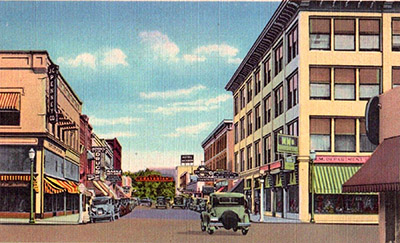MEDFORD, JACKSON COUNTY; 1920s, 1930s:
‘Jackson County rebellion’ started as newspaper fight
Audio version: Download MP3 or use controls below:
|

And things were only getting worse. As the years rolled by, the “roaring twenties” were particularly good to Medford’s social elite as the worldwide market for luxury goods such as the region’s famous Winter Pears grew and strengthened; but the benefits largely passed the backcountry folks by. Their resentment simmered on quietly, ignored by the ruling elites … until Fehl got involved. Fehl was soon joined by Banks in pandering to this audience. Banks’ efforts to get himself accepted into elite Jackson County society had not worked out, and he was already clashing with other growers who wanted to form a marketing cooperative like the one he’d feuded with in Riverside. Soon Banks and Fehl were allies and friends. And soon they also became colleagues. In the fall of 1929, Banks got the opportunity to buy one of Medford’s two daily newspapers, and he jumped at the chance. Now, at last, Fehl and Banks were in perfect position, ready to launch the media propaganda campaign that would, they hoped, propel them to political power by giving the disenfranchised country folk of Jackson County a ticket to vote for. Fehl and Banks got started immediately with a campaign of savage, divisive editorial rabble-rousing aimed at energizing the rural Jackson County residents whom they had identified as their base constituency. They planned to keep it up for a couple years, whipping the rural residents’ frustrations into active hostility against the incumbent elites, and then offer themselves and a slate of their friends as a political ticket. There was a major complication coming around the next corner, though, for both these would-be insurgency leaders. Just a few weeks after Llewellyn Banks embarked on his new career as a newspaper editor and publisher, the bottom fell out of the stock market on the other side of the continent — and the country began a slow, terrifying plunge into the worst economic depression in its history. It would, over the next couple years, hit Jackson County with crushing force. And unlike the prosperity of the “roaring twenties,” its effects would be felt by everyone. By 1932, the rural residents of Jackson County were not merely angry — they were, increasingly, desperate. And they responded to the two publishers’ campaign more wholeheartedly than the plotters had dreamed. Llewellyn Banks and Earl Fehl were, in effect, sowing the wind. Within a couple years, both men would reap the ensuing whirlwind, and it would put both of them in prison along with several of their friends — and, directly or indirectly, it would put four other Jackson County residents in the ground. We’ll talk about how that played out in Part Two of this three-part series.
|
Background photo is a hand-tinted image of Depoe Bay's famous Spouting Horn, published circa 1930 on a picture postcard.
Scroll sideways to move the article aside for a better view.
Looking for more?
On our Sortable Master Directory you can search by keywords, locations, or historical timeframes. Hover your mouse over the headlines to read the first few paragraphs (or a summary of the story) in a pop-up box.
... or ...

©2008-2016 by Finn J.D. John. Copyright assertion does not apply to assets that are in the public domain or are used by permission.

